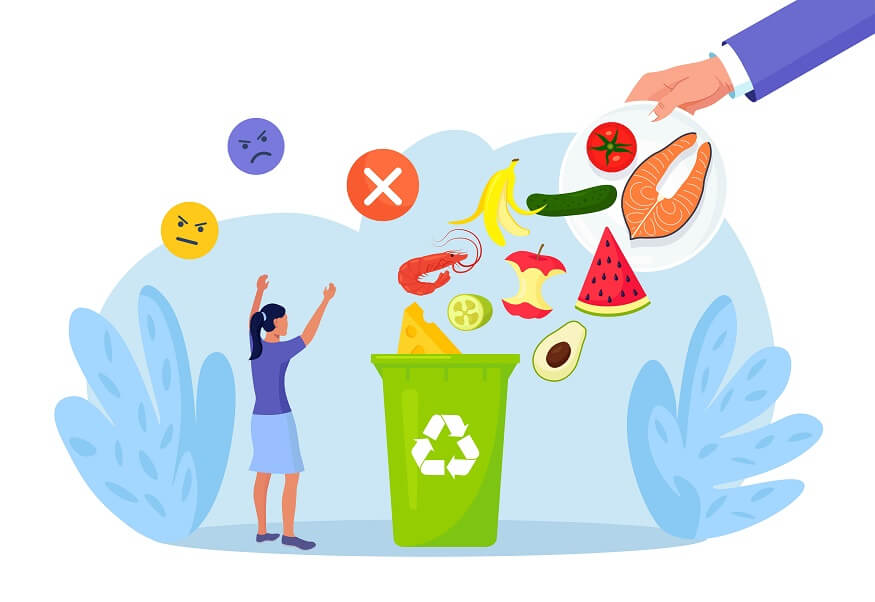Have you ever found yourself mindlessly throwing away perfectly edible food without thinking twice? Throwing food is an incredibly widespread behaviour that not only wastes precious resources but also poses a danger to the environment. Additionally, it costs us money we didn’t have to spend and significantly adds to the worrying worldwide problem of food waste, which is about 1.3 billion tonnes each year. But kicking this bad habit is more than just being responsible; it also needs strategies to prevent food throwing towards sustainable living, which promotes a more moral and ecologically conscientious way of life. We will explore a wide range of practical and workable alternatives to assist you in breaking the habit of throwing food away. Your life and the lives of others around you will be positively and significantly impacted by doing these positive mealtime behaviours.
1. Plan Your Meals Wisely to Minimise Leftovers and Reduce Waste:
One of the primary culprits behind discouraging food throwing is overbuying or preparing more food than needed. By thoughtfully planning your meals in advance and creating a comprehensive shopping list based on realistic consumption, you can significantly mitigate the likelihood of leftovers going to waste. This thoughtful approach fosters a more conscious and responsible shopping habit, thereby promoting sustainable living and reducing the strain on our planet’s limited resources.
2. Embrace Leftovers and Introduce “Planned-Overs” for Resourcefulness:
Transform your perception of leftovers from mere remnants to opportunities for creativity and resourcefulness. Embrace the ingenious concept of “planned-overs” by intentionally cooking more food than required for a single meal. Setting aside the extra portion for later consumption not only saves precious time and energy during future meal preparations but also celebrates a mindful approach to reducing food waste and maximising the utility of every ingredient, thereby promoting more sustainable and efficient use of food resources.
3. Learn Proper Storage Techniques to Extend Freshness and Minimise Waste:
Arm yourself with knowledge about proper food storage techniques to prolong the freshness of perishables and prevent premature spoilage. Investing in high-quality airtight containers and familiarising yourself with the optimal storage methods for different food items will significantly extend their shelf life. These conscious strategies to prevent food throwing effort not only reduce food waste but also promote a sense of responsibility toward the environment by reducing the demand for excess production and transportation of food items.
4. First In, First Out: Organise Your Kitchen Wisely to Reduce Waste:
Maintain an organised kitchen and practise the prudent “first in, first out” principle when storing groceries and arranging items in your fridge. By judiciously using the oldest food items before newer ones, you prevent valuable ingredients from getting lost at the back and expiring unnoticed. These simple strategies to prevent food throwing organisational habits ensures that all items are consumed in a timely manner, substantially managing food throwing behaviour in your household, and fostering a more mindful and efficient approach to meal planning and preparation.
5. Practice Portion Control for Responsible Eating and Minimise Waste:
Cultivate an acute sense of portion control when serving meals, ensuring that you consume only what you need. Starting with smaller portions and offering seconds only when genuinely hungry not only reduces excess food on your plate but also fosters healthier eating habits. As you consciously use strategies to prevent food throwing, you will also experience the benefits of improved overall well-being, contributing to a healthier lifestyle for yourself and a more sustainable future for the planet.
6. Get Creative with Scraps: Repurpose and Reuse for Sustainable Living:
Transform food scraps from disposable waste to valuable ingredients through ingenuity and resourcefulness. Instead of discarding vegetable peels, stems, or meat bones, discover the art of using them creatively. Vegetable scraps can be turned into flavorful and nutritious broths, while meat bones serve as the foundation for hearty soups. Embrace these innovative practices to repurpose food scraps into delightful dishes, significantly reducing waste while adding delightful variety to your meals and demonstrating a commitment to sustainable living.
7. Reinvent Leftovers into Exciting New Meals for Mealtime Satisfaction:
Unleash your culinary creativity and transform leftovers into entirely new, exciting meals. Repurposing last night’s roast chicken into a mouthwatering sandwich or using yesterday’s rice to craft a delightful stir-fry not only reduces waste but also elevates your dining experience. By continuously experimenting with different combinations, you’ll make eating leftovers a delightful experience rather than a mundane chore, inspiring others around you to follow suit in their efforts to reduce food waste.
8. Donate to Food Banks: Spread the Goodness and Combat Waste:
Act compassionately by donating excess non-perishable food items or canned goods to local food banks or shelters. Your act of kindness can make a profound difference in someone else’s life while simultaneously preventing unnecessary food waste. By actively contributing to your community and supporting those in need, you inspire positive change and foster a sense of responsibility toward reducing food waste on a larger scale, creating a ripple effect of goodness and social impact.
9. Practise Mindful Shopping for Smarter Choices and Reduced Waste:
Before impulsively purchasing food items, thoughtfully assess whether you will realistically consume them before they spoil. Embrace mindful shopping by being honest about your needs and making conscious choices, resulting in reduced food waste, and enhanced financial savings. This mindful approach not only benefits you but also contributes to the collective effort in combating food waste, promoting sustainable practices, and safeguarding the environment for future generations.
10. Compost Food Scraps for Eco-Friendly Disposal and Sustainable Living:
Incorporate eco-friendly practices by composting food scraps instead of contributing to landfill waste. Composting promotes sustainable practices and a healthier environment by reducing trash and producing nutrient-rich soil for gardening. By choosing composting as a responsible disposal strategy, you actively contribute to reducing the environmental effect of food waste, making a significant contribution to the overall fight against climate change and the preservation of the fragile ecology of the world.
Conclusion:
Strategies to prevent food throwing may require time and effort, but the manifold benefits are undoubtedly worth it. You may drastically minimise food waste and its harmful effects on the environment by making intelligent meal plans, enjoying leftovers, and developing mindful purchasing practices. Even the apparently trivial things we do influence the sustainability of our world. It is crucial to recognize that our decisions may influence a better future for the environment and for ourselves. Let’s promise to welcome change for the better and encourage others to do the same. By cultivating mindful consumption, resourcefulness, and responsible habits, we can spark a powerful global movement toward a brighter future. Together, let’s contribute to a world where every decision we make aligns with the goal of preserving and nurturing the planet for the generations to come.
A Euroschool, we believe in cultivating responsible habits that promote sustainable living and environmental consciousness. Managing food throwing behaviour is one area where we can have a big influence. Throwing food away is a common practice that adds to the world’s problem of food waste while also wasting valuable resources. By adopting positive mealtime behaviours such as planning meals wisely, embracing leftovers, practising portion control, and creatively repurposing food scraps, we can instil a sense of responsibility in our students and families. Through mindful shopping and donating excess food items to those in need, we can foster a culture of compassion and social responsibility. At Euroschool, we encourage everyone to take small yet meaningful steps towards kicking discouraging food throwing habits and contribute to building a sustainable future for our planet.









